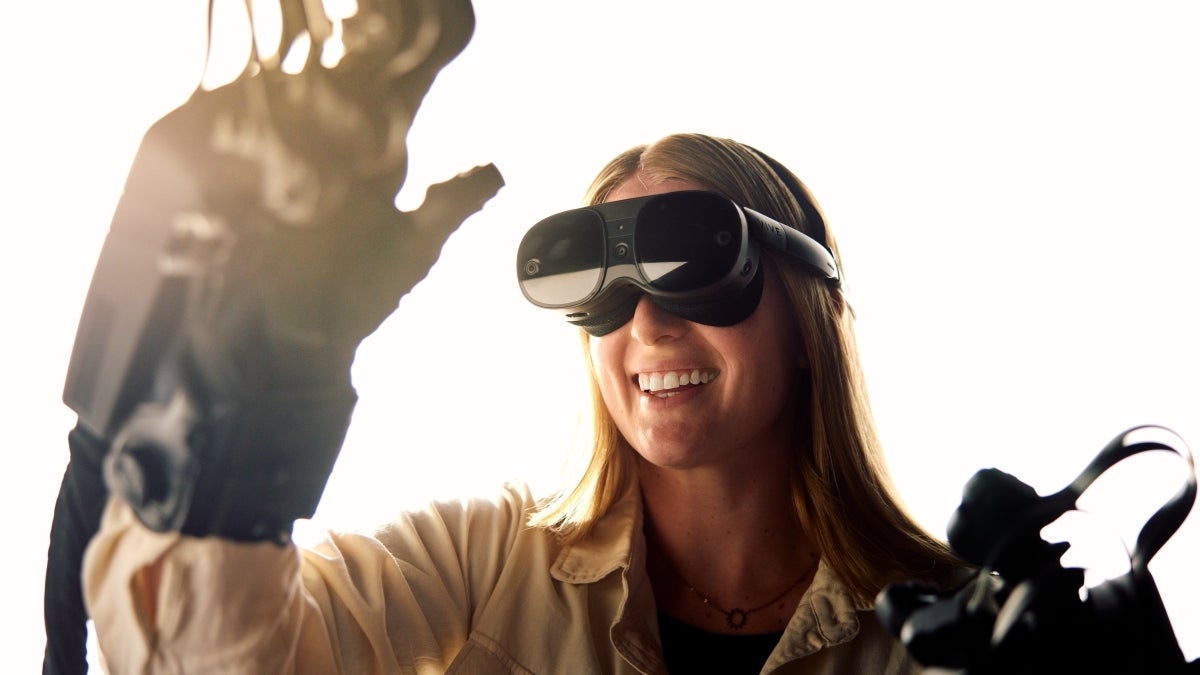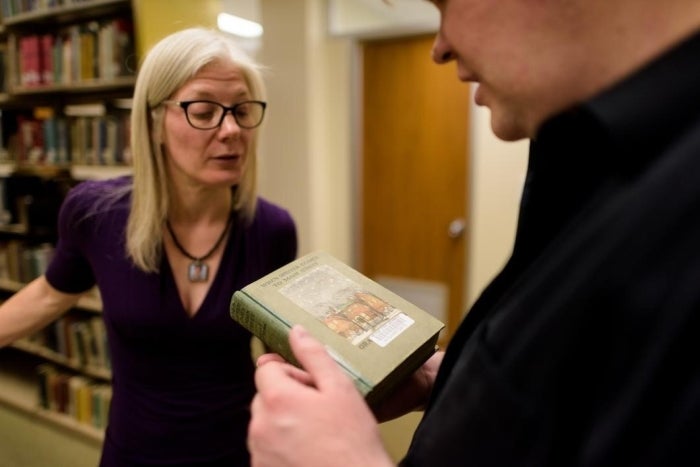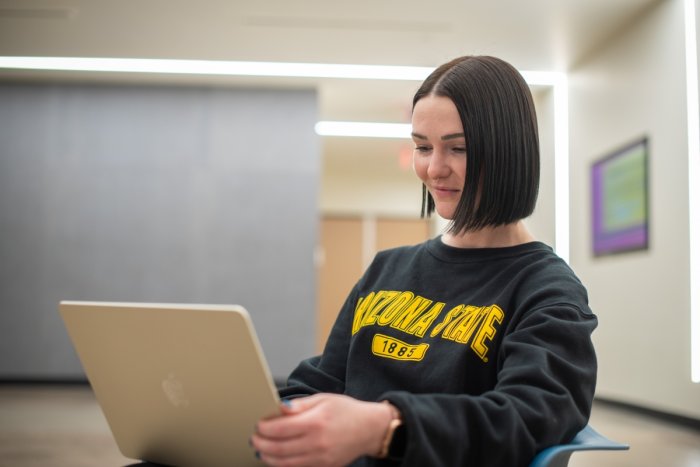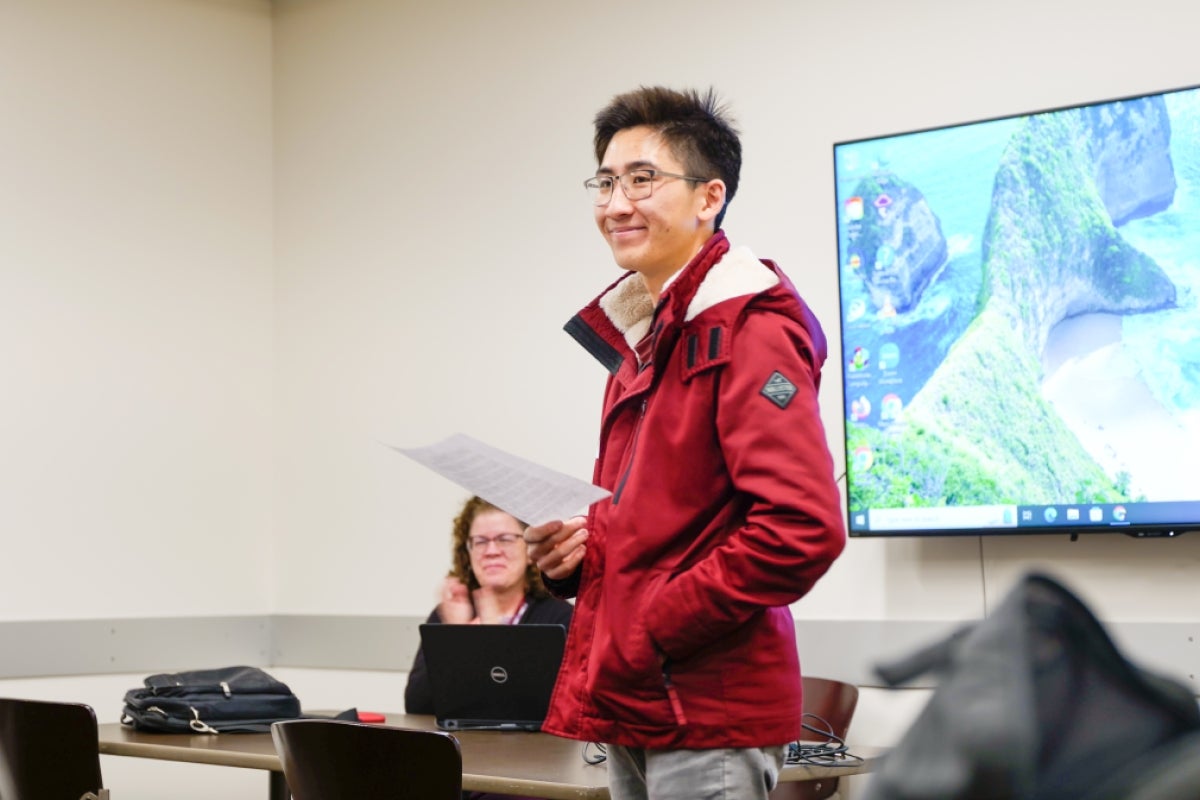ASU English department inaugurates student research initiatives

Amber Hedquist, a PhD student in English and a management intern with ASU Knowledge Enterprise, is researching generative AI. Hedquist is one of several students being mentored on AI projects by faculty in the ASU English department. September 2024 photo by ASU Thrive magazine
The Department of English at Arizona State University has launched a cluster of initiatives aimed at bolstering student research and professional experiences.
First, English’s internship and career readiness program is the home of the new set of Research Internship Awards, funded by an anonymous donor.
Second, each degree area within the department nurtures student research productivity through professional presentation and networking experiences — the most recent example of which is the Undergraduate Literature Research Showcase, held on Jan. 29 at the Memorial Union.
“Students interested in career readiness, whether that means developing analytical skills or mastering what you can do with generative large language models (LLMs), ought to be seriously considering what we can offer them in English,” said Professor Manushag “Nush” Powell, chair of the Department of English. “Our research internships and showcase opportunities are about helping our students become their own best ambassadors to the world around them.”
Funding for mentored research
The Research Internship Awards program pairs undergraduate or graduate students who have a germ of a research idea with faculty experts on that topic. Participants can be ASU Online or Tempe campus students who work closely with the selected faculty member to structure a research internship; the student then receives a research award when the internship is completed and chooses whether or not to earn academic credit.
“Funded research internships for English majors are an investment in the future,” said Ruby Macksoud, the department’s director of internships. “Students work with experienced scholars to merge their academic curiosity with professional mentorship and to collaborate on original research. It's not just an honor — it's fuel for the next generation of impactful scholars, storytellers, writers and leaders.”
This spring, five students — two undergraduates and three graduate students — are working with five Department of English faculty members on research topics ranging from Jane Austen to AI.
For example, Regents Professor Devoney Looser is mentoring research intern Dahlia Horani, a double major in English (literature) and psychology. Horani’s interest in Jane Austen began in seventh grade, when she was encouraged by a friend to read “Pride and Prejudice.”
“I could not believe that this was a book published in the early 1800s,” Horani wrote in her project statement. “It was witty and sarcastic, my two favorite qualities at the time, and the main heroine was someone who stood up for herself and wouldn’t settle for someone she didn’t like, despite not having any prospects and being from a poor family.”
Horani will be working closely with Looser on final research and edits to Looser’s new book, “Wild for Austen,” forthcoming from St. Martin’s Press in September 2025. Horani said that her dream is to someday work in the publishing industry, so the experience is giving her valuable, firsthand experience in its workings from an author’s standpoint.
Assistant Professor Gabriel Acevedo, a specialist in literacy education and young adult literature, is supervising English education graduate student Adriana Diaz’s analysis-based project. Diaz is beginning a qualitative study of how students write about their cultural identities in first-year composition classes.
“By working through my collected data in a structured research environment,” Diaz said, “I hope to gain invaluable experience in data analysis and academic writing, positioning myself to make meaningful contributions to English education scholarship.”
Professor Kyle Jensen, who directs ASU Writing Programs and is an authority on the use of AI in education, is working with Kylie Frontczak, a doctoral student in English education. Frontczak’s research interests are in understanding how generative artificial intelligence (genAI) is reshaping teaching, learning and policy in postsecondary education. During the internship, Frontczak is shadowing Jensen at The College of Liberal Arts and Science’s AI Working Group meetings and plans to seek Institutional Review Board approval for interviews she’ll conduct with faculty and administrators about institutional uses and barriers regarding AI.
“This research is particularly important as universities grapple with the sudden changes genAI is presenting to pedagogy and student learning,” Frontczak said.
An opportunity to be the expert
Making this intellectual work “public” is another important step in the research process. To help, the Department of English has built new modes of academic connection into its extracurricular offerings. This focus is especially relevant for undergraduate students, who may not otherwise be able to access these networking opportunities.
The Jan. 29 literature showcase provided an informal but rigorous practice session for sharing research findings. More than 20 students presented work produced in 2024 literature courses across a range of forms, including scholarly essays, creative projects and illustrative displays.
“The showcase was an opportunity for students to share their hard work with a broader audience of friends, family, peers and professors,” said Professor Lee Bebout, who directs ASU’s English literature program. “It is a part of a sustainable, slow-growth strategy to cultivate a stronger sense of community in the middle of our dauntingly large campus.”
Bebout helped organize and host the event, along with Program Manager Mary Beth Hollmann and faculty members Melissa Free, Brian Goodman and Christine Holbo.
“From argument-driven papers about ‘Inglourious Basterds’ and ‘Mexican Gothic,’ to poems and virtual artifacts, it was incredible to see what our amazing English students are doing in literature classes,” Goodman said.
Other student research opportunities at ASU English
With support from the humanities division of The College of Liberal Arts and Sciences, a second Undergraduate English Literature Showcase is in the works for spring 2026. It joins other annual research and professional development experiences for students — especially undergrads — that are already well established in the department, including:
More Arts, humanities and education

ASU professor's project helps students learn complex topics
One of Arizona State University’s top professors is using her signature research project to improve how college students learn science, technology, engineering, math and medicine.Micki Chi, who is a…

Award-winning playwright shares her scriptwriting process with ASU students
Actions speak louder than words. That’s why award-winning playwright Y York is workshopping her latest play, "Becoming Awesome," with actors at Arizona State University this week. “I want…

Exceeding great expectations in downtown Mesa
Anyone visiting downtown Mesa over the past couple of years has a lot to rave about: The bevy of restaurants, unique local shops, entertainment venues and inviting spaces that beg for attention from…






